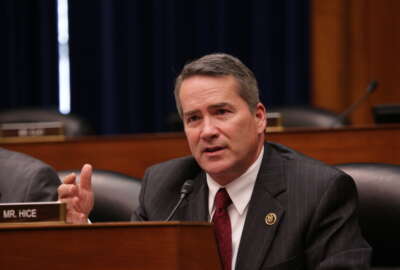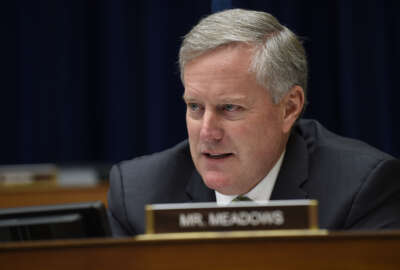
New bill would limit VA employees’ use of official time
Official time has been a hot topic for House lawmakers this week. A new bill would limit official time for all employees at the Veterans Affairs Department and...
House lawmakers turned their attention in full force this week to official time.
After hours of contentious debate, the House Oversight and Government Reform Committee cleared two bills on official time. The committee approved the Official Time Reform Act of 2017, which prevents any days that an employee mostly spends on official time from counting toward his or her retirement annuity.
Democrats offered eight amendments to the bill, but the committee rejected all of them in a March 8 vote.
The second bill requires the Office of Personnel Management to submit an annual report to Congress on federal employees’ use of official time.
And Rep. Jodey Arrington (R-Texas), the House Veterans Affairs Economic Opportunity Subcommittee Chairman, introduced legislation specifically targeting official time for employees at the Veterans Affairs Department.
The Veterans, Employees and Taxpayers Protection Act would require the VA secretary accurately keep track of how much official time his employees use and submit an annual report to Congress and OPM.
The bill also prohibits physicians, dentists, podiatrists, chiropractors and optometrists from using official time at all.
VA employees involved in delivering direct patient care cannot spend more than 25 percent of their work hours on official time. And no VA employee can spend more than 50 percent of his or her time doing union business, the legislation said.
“It is outrageous and unconscionable that VA employees, especially employees who provide much needed health care services, are spending the majority of their time conducting union business instead of fulfilling the duties they were hired to do,” Arrington said in a statement.
In addition, the VETS Protection Act extends the probationary period to 18 months for new employees at VA.
The bill’s introduction follows a joint hearing between the House Oversight and Government Reform and Veterans Affairs committees. Lawmakers from both committees were baffled by a recent Government Accountability Office report that said at least 340 VA employees spent 100 percent of their working hours on union business in fiscal 2015. By one estimate, about 90 nurses, three addiction therapists, 13 nursing assistants and three pharmacists were among those at VA who spent 100 percent of their normal work hours on official time.
Lawmakers said they couldn’t see how official time contributes to the quality of veterans’ health care. The American Federation of Government Employees, which represents many VA employees, says official time gives workers the tools they need to best serve veterans.
“Until you can show me that official time can be directly correlated to the quality of health care that our veterans deserve, we have to reform it,” Government Operations Subcommittee Chairman Mark Meadows (R-N.C.) said at the Feb. 16 hearing.
Recruiting and retaining VA employees
Recruiting and retaining new talent has long been a challenge for VA and the rest of government.
The House Veterans Affairs also approved a new piece of legislation that would give the department a few tools to recruit top health and benefits professionals.
The legislation, which Rep. Brad Wenstrup (R-Ohio) introduced this week, would set up an executive management fellowship program. It would establish an exchange program of sorts for Veterans Health Administration and Veterans Benefits Administration employees to gain training and experience with the private sector, and vice versa.
The VA secretary could select 18 to 30 VA employees for the year-long fellowship.
The bill also requires the secretary to conduct annual performance plans for the department’s political appointees in a similar manner to career employees. Specifically, political appointees would receive ratings based on their ability to recruit, hire and retain new employees and keep them engaged, trained and motivated.
In addition, the legislation requires VA to track each of their vacant positions in a single database. By the latest count, the department has roughly 45,000 open positions.
The department would create a promotional track system for technical experts. The idea is to give IT and tech experts a chance to “advance with the department without being required to a management position,” the bill said.
This has long been criticism from federal managers and senior executives, who say agencies often end up recruiting their best technical experts to leadership positions, who often lack solid managerial skills.
Copyright © 2024 Federal News Network. All rights reserved. This website is not intended for users located within the European Economic Area.
Nicole Ogrysko is a reporter for Federal News Network focusing on the federal workforce and federal pay and benefits.
Follow @nogryskoWFED





